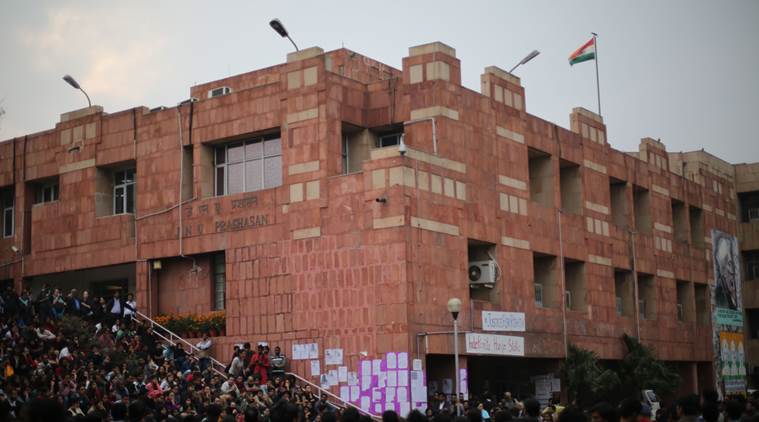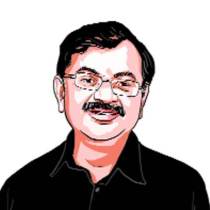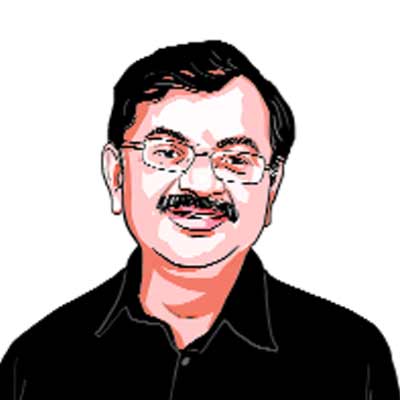Nehru’s adversary
A JNU meet on Syama Prasad Mookerjee has powerful symbolic significance

Students gather in front of JNU Administration block on Friday. Express photo by Oinam Anand. 19 February 2016
JNU, till recently known as the hub of elements who took pride in raising anti-national slogans and demanding “azadi” for Kashmir, held a programme, perhaps a first, to celebrate the memory of Syama Prasad Mookerjee as an academician and icon of national integration. The speakers, Minister of State Jitendra Singh, Lt General (retd) Ata Hasnain and I, were first taken to the Wall of Heroes, which has 21 portraits of soldiers honoured with Param Veer Chakra, by vice-chancellor, Jagadesh Kumar, where we offered flowers.
The programme had great symbolic significance. Jawaharlal Nehru, after whom the university is named, was always known as a political opponent of Mookerjee — former Prime Minister Atal Bihari Vajpayee had accused Nehru of hatching a conspiracy with Sheikh Abdullah to kill Mookerjee in a Srinagar jail in 1953. The Nehruvian years never allowed Mookerjee to be accorded the status he deserved, leave aside holding a seminar in his memory in any centre under their control. No Congress leader attends even the customary observances of Mookerjee’s birth and death anniversaries in the Central Hall of Parliament.
The meet in JNU was historic and it was natural that all the speakers spoke about the academic credentials of Mookerjee, his convocation addresses — more than 22 in major Indian universities, including in Delhi University in 1952 — and, of course, his differences with Nehru. The one line quote of Jagadesh Kumar that the media picked up was innocuous — it referred to Mookerjee’s speech in the Lok Sabha on June 2, 1951, where he accused Nehru of raising the issue of communalism to distract the nation’s attention from other burning issues like “challenges to overcome poverty, hunger, mal-administration, corruption and complete surrender to Pakistan”. Kumar reportedly said: “Today, we are in the same situation. While we are fighting to build an inclusive, integrated and strong India, there are inimical forces both within and outside India who are trying to divert our attention from building a strong, unified nation”.
That the media should highlight the Nehru remark and obfuscate the salient features of Mookerjee’s life discussed at the meeting is an example of editorialised reporting. But the remark, critical of Nehru, seems to have offended some so much that questions were raised on how a VC of a university named after Nehru can criticise him, even if he had only quoted Mookerjee.
This raises a basic question: Is Nehru a prophet beyond re-evaluation, review and re-reappraisal?
In fact, now is the time to find out how Nehru acted when Mookerjee was fighting a battle to keep Kashmir within the Indian constitutional framework. Announcing his resolve to enter Jammu and Kashmir without permit, Mookerjee had stated: “Mr Nehru has repeatedly declared that the accession of the State of Jammu and Kashmir to India has been hundred per cent complete. Yet it is strange to find that one cannot enter the State without a previous permit from the Government of India. This permit is granted even to Communists who are playing their usual role in Jammu and Kashmir. But entry is barred to those who think or act in terms of Indian unity and nationhood.”
Mookerjee, who became a barrister at 26, and VC of Calcutta University at 33, was the voice of millions of Hindus, who were at the receiving end of Muslim League extremism and the violence led by Mohammed Ali Jinnah. In Jinnah’s infamous speech at Calcutta in 1946, which triggered the Calcutta killings, he had said: “I am not prepared to discuss ethics. We have a pistol and are in a position to use it.”
Mookerjee was not anti-Muslim in his writings, speeches or actions. He stood firmly for the unity of both communities. In his Calcutta University convocation address on March 2, 1935, he said: “It is for us to set our house in order. It is for us, and specially the younger generation, Hindus, Moslems and Christians alike, to combine and resolutely stand for the permanent well-being of our province and to rescue her from the deadly stagnation which now seems to envelop her.” His role in helping Kazi Nazarul Islam during his illness is well-known and Kazi’s letter, written to him from Dhaka in gratitude, is a part of Bengali literature.
Mookerjee was arrested while entering Jammu and Kashmir. The J&K government was not empowered to issue a permit to enter the riyasat at that time; only the Union government could. So when the Union government had allowed him to go to Kashmir, how could the state government detain him? Why did Nehru decline to look into it though Mookerjee was his former cabinet colleague and a fellow parliamentarian, besides being the national president of a political party? So much was Nehru’s animus towards Mookerjee that when Mookerjee’s mother, Jogmaya Devi, wrote to Nehru after his tragic death demanding an inquiry, Nehru refused to even acknowledge the letter.
Nehru had all the time to vacation in Srinagar with Sheikh Abdullah, but he didn’t even meet Mookerjee once, who was, after all, an Indian fighting for the country’s cause. The government must probe the last days of Mookerjee and the role of Abdullah and Nehru in his death. It must also track down Mookerjee’s last diary — my question in the Rajya Sabha regarding this received a vague reply after six months.
The writer is a former BJP MP
For all the latest Opinion News, download Indian Express App
More From Tarun Vijay
- Standing with the chiefGeneral Rawat’s concerned statement on education in Kashmir must be heard ..
- The honour of PadmavatiBox office considerations cannot be allowed to besmirch memories of a hero..
- A New Social AnthemThe irony in Kovind’s elevation to Rashtrapati Bhawan is that at a time when a Dalit from a very marginalised family of Uttar Pradesh has…








































No hay comentarios:
Publicar un comentario